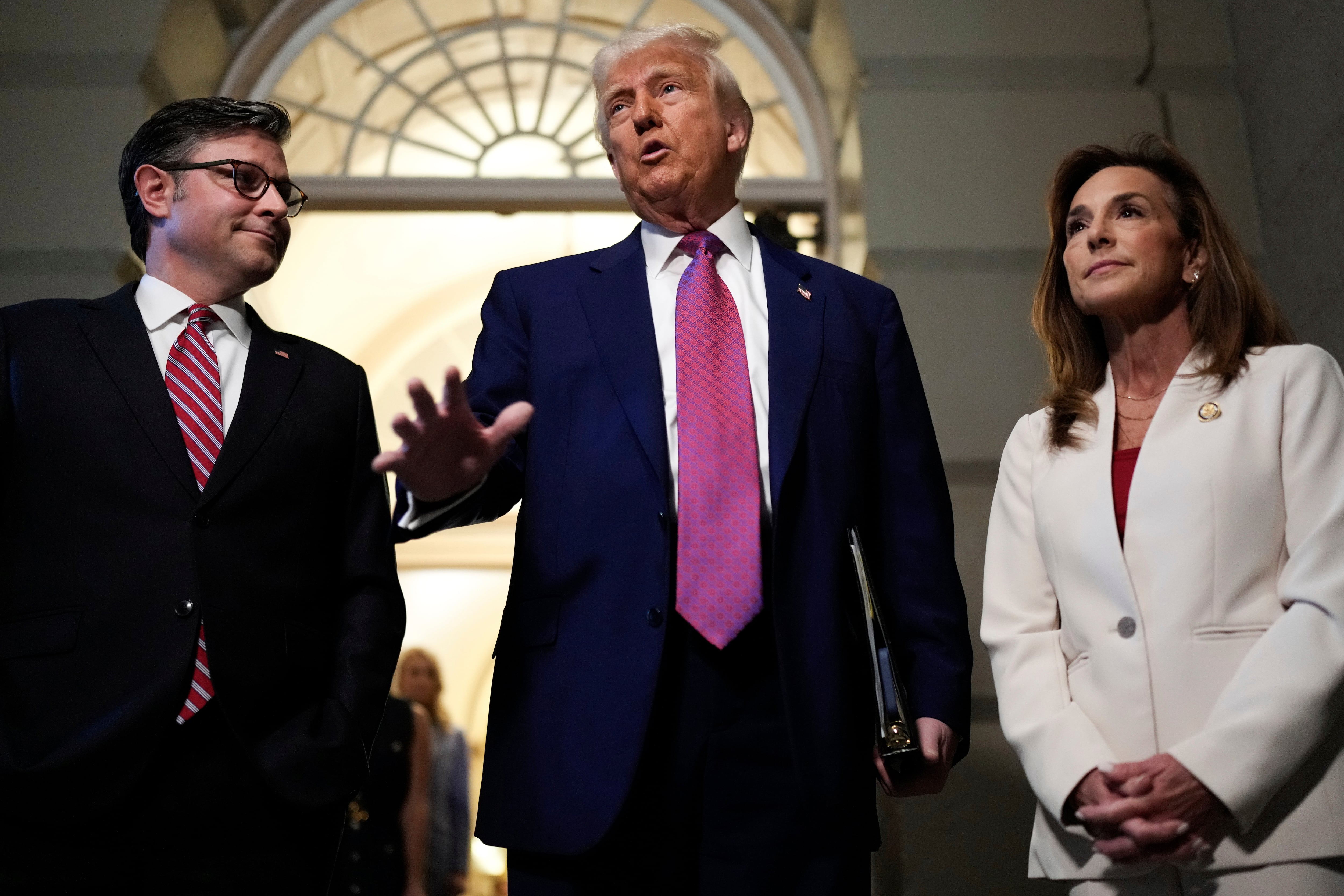WASHINGTON (AP) — President Donald Trump implored House Republicans at the Capitol to drop their fights over his big tax cuts bill and get it done, using encouraging words but also the hardened language of politics over the multitrillion-dollar package that is at risk of collapsing before planned votes this week.
During the more than hour-long session Tuesday, Trump warned Republicans not to touch Medicaid with cuts, and he told New York lawmakers to end their fight for a bigger local tax deduction, reversing his own campaign promise. The president, heading into the meeting, called himself a “cheerleader” for the Republican Party and praised Speaker Mike Johnson. But he also criticized at least one of the GOP holdouts as a “grandstander” and warned that anyone who doesn’t support the bill would be a “fool.”
“We have unbelievable unity,” Trump said as he exited. “I think we’re going to get everything we want.”
The president arrived at a pivotal moment. Negotiations are slogging along and it’s not at all clear the package, with its sweeping tax breaks and cuts to Medicaid, food stamps and green energy programs, has the support needed from the House’s slim Republican majority. Lawmakers are also being asked to add some $350 billion to Trump’s border security, deportation and defense agenda.
Inside, he spoke privately in what one lawmaker called the president’s “weaving” style and took questions.
The president also made it clear he’s losing patience with the various holdout factions of the House Republicans, according to a senior White House official who spoke on condition of anonymity to discuss the private meeting.
But Trump himself disputed that notion as well as reports that he used an expletive in warning not to cut Medicaid. Instead, he said afterward, “That was a meeting of love.” He received several standing ovations, Republicans said.
Yet it was not at all clear that Trump, who was brought in to seal the deal, changed minds.
“We’re still a long ways away,” said Rep. Andy Harris, R-Md., the chair of the House Freedom Caucus.
Conservatives are insisting on quicker, steeper cuts to federal programs to offset the costs of the trillions of dollars in lost tax revenue. At the same time, a core group of lawmakers from New York and other high-tax states want bigger tax breaks for their voters back home. Worries about piling onto the nation’s $36 trillion debt are stark.
With House Democrats lined up against the package as a giveaway to the wealthy at the expense of safety net programs, GOP leaders have almost no votes to spare. A key committee hearing is set for the middle of the night Tuesday in hopes of a House floor vote by Wednesday afternoon.
“They literally are trying to take health care away from millions of Americans at this very moment in the dead of night,” said House Democratic Leader Hakeem Jeffries of New York.
Trump has been pushing hard for Republicans to unite behind the bill, which has been uniquely shaped in his image as the president’s signature domestic policy initiative in Congress.
Asked about one of the conservative Republicans, Rep. Thomas Massie of Kentucky, Trump lashed out.
“I think he is a grandstander, frankly,” the president continued. “I think he should be voted out of office.”
But Massie, a renegade who often goes it alone and wears a clock lapel pin that tallies the nation’s debt load, said afterward he’s still a no vote.
Also unmoved was Rep. Mike Lawler, one of the New York Republicans leading the fight for a bigger state and local tax deduction, known as SALT: “As it stands right now, I do not support the bill. Period.”
The sprawling 1,116-page package carries Trump’s title, the “ One Big Beautiful Bill Act," as well as his campaign promises to extend the tax breaks approved during his first term while adding new ones, including no taxes on tips, automobile loan interest and Social Security. There’s also a higher standard deduction, of $32,000 for joint filers, and a bigger child tax credit.
The Committee for a Responsible Federal Budget, a nonpartisan fiscal watchdog group, estimates that the House bill is shaping up to add roughly $3.3 trillion to the debt over the next decade.
Republicans criticizing the measure argued that the bill’s new spending and tax cuts are front-loaded, while the measures to offset the cost are back-loaded.
In particular, the conservative Republicans are looking to speed up the new work requirements that Republicans want to enact for able-bodied participants in Medicaid. They had been proposed to start Jan. 1, 2029, but GOP Majority Leader Steve Scalise said on CNBC that work requirements for some Medicaid beneficiaries would begin in early 2027.
At least 7.6 million fewer people are expected to have health insurance under the initial Medicaid changes, the nonpartisan Congressional Budget Office said last week.
Republican holdouts are also looking to more quickly halt green energy tax breaks, which had been approved as part of the Biden-era Inflation Reduction Act, and are now being used for renewable energy projects across the nation.
But for every change Johnson considers to appease the hard-right conservatives, he risks losing support from more traditional and centrist Republicans. Many have signed on to letters protesting deep cuts to Medicaid and the rolling back of clean energy tax credits.
The New Yorkers are fighting for a larger state and local tax deduction beyond the bill’s proposal. As it stands, the bill would triple what’s currently a $10,000 cap on the state and local tax deduction, increasing it to $30,000 for joint filers with incomes up to $400,000 a year. They have proposed a deduction of $62,000 for single filers and $124,000 for joint filers.
Trump, who had campaigned on fully reinstating the unlimited SALT deduction, now appears to be satisfied with the proposed compromise, arguing it only benefits “all the Democratic” states.
If the bill passes the House this week, it would then move to the Senate, where Republicans are also eyeing changes.
___
Associated Press writers Darlene Superville and Seung Min Kim contributed to this report.













